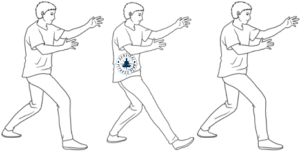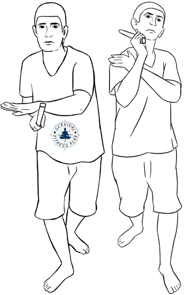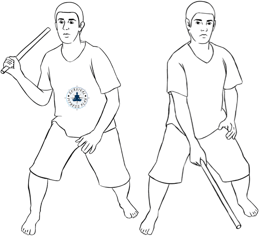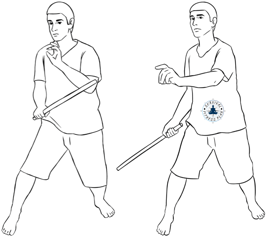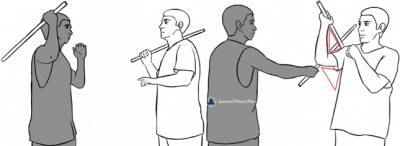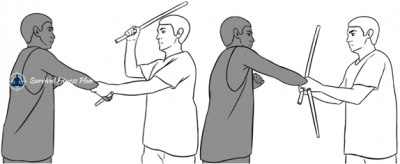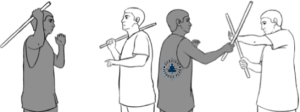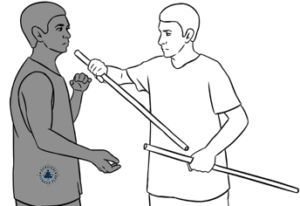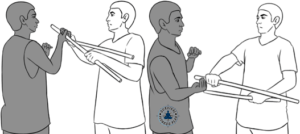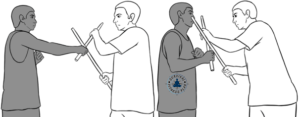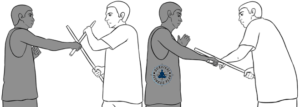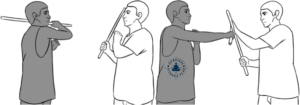Basic Stick Fighting Techniques for Self Defense
Here are some basic stick fighting techniques for self defense. It covers stance, stepping, strikes, and defense.
There are many stick fighting styles from around the world. This stick fighting training is a mixture of Filipino stick fighting forms.
I use the terms Kali, Escrima, and Filipino stick fighting interchangeably in this article. They all mean the same thing – fighting with a stick.
Contents
Stick Fighting Basics – Stance
Stick Fighting Tutorial – Stepping
Stick Fighting Lessons – Strikes
Stick Fighting Moves – King Strike
Stick Fighting Drills – Cutting Strikes
Stick Fighting Exercises – Stick Fight Blocking
Stick Fighting Filipino King Block
Stick Fighting Routine – Parry Drill
Stick Fighting Instruction – Returning to 7 Drill
Stick Fighting Locks and Disarms
Twist Snatches
Lever Snatches
But Strike Snatches
3 Self Defense Training Manuals for 1 Low PriceGet Your Copy of the Vortex Control Self Defense Bundle Today
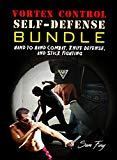
Vortex Control Self Defense Bundle: Hand to Hand Combat, Knife Defense, and Stick Fighting

Price Disclaimer
Basic Stick Fighting Techniques for Self Defense
Stick Fighting for Beginners – Stick Fighting Stance
When Escrima fighting with a stick the first thing to learn is correct stance.
When stationary stand with your feet a bit wider than shoulder width apart.
Hold the stick in your strongest hand and have your strong side as your lead. The bottom of your weapon extends between 1 and 2 inches below your little finger.
Unless striking or blocking, hold your stick over your shoulder. Your hand is near your ear on the same side and the tip of your weapon points to your rear. Doing this will:
Keep your hand out of range from your opponent’s strike. If he hits your hand you might drop your weapon.
Give your strikes the greatest power and speed for attacking your primary target, i.e., your opponent’s head.
Your rear hand is a back-up for defense or secondary attack. Keep it close to your centerline most of the time.
Your stance never exaggerates too long or short.
Keep most of your weight on your rear leg. The heel of your front foot lands first and then the toes from both feet land at the same time. This keeps you grounded and ready for the next move.
Stick Fighting Elementary Strikes
When practicing self taught stick fighting you want to stick to the basics. Here are the single stick elementary strikes.
The King Strike
The best strike in stick fighting by far is the “king strike”. Filipino stick fighting drills this is the number 7 strike.
The number 7 strike comes straight down between your eyes. With it, you own the center-line, and who-ever owns the center-line has the advantage.
When striking, target your opponent’s face or the top of his head. In a defensive capability, it protects you from any angulated strike.
To do the number 7 strike, start in the basic stance. Bring your stick straight down the center into your target.
As the stick comes down your other hand comes up. This helps keep you balanced/symmetrical and is also a backup defense.
Escrima Stick Fighting Drills – Cutting Strikes Drill
In this single stick training drill you will practice cutting strikes.
Cutting strikes are those that you follow through on. Like a slash with a sword.
This is as opposed to stopping or bouncing off when you make contact.
When practicing these kali stick fighting strikes, stand a little wider than shoulder width. Lead with your strong side and have your body at 45° to your target. Point your feet toward your enemy.
Practice using circular forces. Roll your strikes using your waist. The power comes from body motion, not your arm.
Using your arm and wrist lacks power. It is good for the sport to get fast points but not very effective on the street. Big hits end fights.
These martial arts stick fighting techniques are short range. Do not extend your arm too much. You may get more distance but it loses power at your shoulder. It will also make it easier for your opponent to manipulate/grab your stick and/or arm.
Aim to hit your target with the top couple of inches of your stick. The strikes go through your opponent in a cutting motion.
Backhand to the Head
Start with the stick on your left side to the top of your left shoulder. Strike diagonal and down across your body to your bottom right.
Backhand to Knee
Raise the stick up to your left shoulder. Stay low.
Stick Fighting for Self Defense – Blocks
Learning defensive Escrima stick fighting techniques is important.
The following are practical and easy to do.
King Block
If your opponent uses an angled attack, your number 7 will win.
When you both use king strikes then whoever is first to the target has the advantage. If you are not the first, you must turn your attack to defense.
Note: If both fighters use king strikes at the same time then the tips of the stick will clash. In reality, this is unlikely because doing a perfect king strike is rare. In most cases, it will angle a little to one side.
To make the king strike defensive place your rear hand behind your stick as you do the strike.
If needed you can turn a little toward the angle your opponent’s strike is coming on. Do not turn over 10°.
Creating triangles makes the defense structure strong.
Once you have deflected the attack, counter-attack (left picture below).
You can use your other hand to help guide his stick out of the way (right picture below), or if you are ahead of his timing, your sticks may not even come into contact.
When you need to deflect on your left side point your stick over your left shoulder. The triangle is still there.
Grab the top of your opponent’s stick with your left hand. Use an overhand grip (palm facing down).
Pull your opponent’s stick down towards the outside of his guard so it is horizontal.
Your 2 sticks form a cross. Your stick is close to your opponent’s hand.
Fist on Fist
Your opponent attacks with a forward downward strike. Block the strike.
Finish with a strike to your opponent’s face.
Twist your opponent’s stick anti-clockwise to your left using your stick as a fulcrum.
As you do this, you need to let the stick “spin” in your right hand so you finish with an overhand grip. Once your opponent’s stick is towards your left side tighten your grip.
Keep twisting until the stick comes out of your opponent’s grip. Aim the bottom of the stick towards his groin. Not only will this hit him, it also makes it easier to get the stick out of his grip.
Do a second thrust past your opponent’s head. This may also be unintentional if you missed the first thrust. Next, use your arm as the fulcrum point to disarm your opponent in the same way as snatch 8.
Grab your opponent’s right wrist using an underhand grip.

